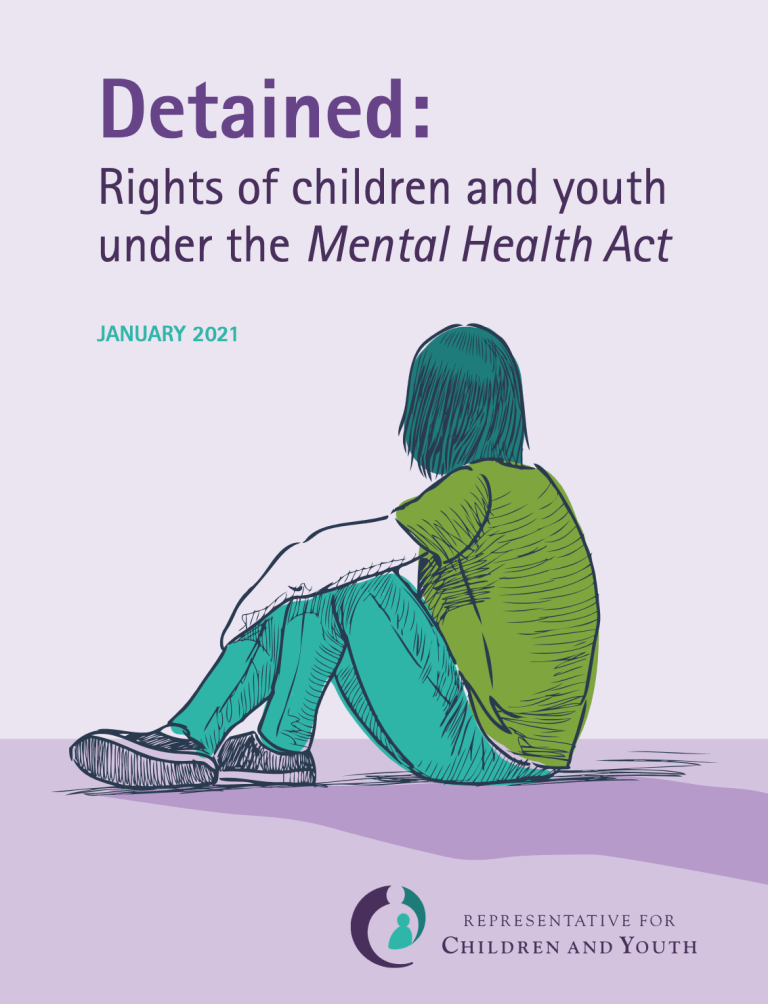14 search results
Overarching
Recommendation 1: That the Ministry of Mental Health and Addictions work with the Ministry of Health and the Ministry of Children and Family Development to conduct a review, after consulting with health authorities, First Nations, Métis Nation and urban Indigenous communities and leadership and other appropriate bodies, into the use of involuntary mental health care for children and youth to identify the conditions that are contributing to its increased use, and identify immediate opportunities to provide voluntary interventions or improve practices that would reduce involuntary admissions. Review to be complete by Jan. 1, 2022.-
Category and theme:
Audience:
Groups affected:
Overarching
Recommendation 2: That the Ministry of Health require health authorities to collect and report key information pertaining to children and youth admitted under the Mental Health Act in a way that is standardized across the province and reported regularly, including but not limited to:- identity factors (ethnicity, gender identity);
- Indigeneity – First Nations, Métis and Inuit identity;
- standardized length of stay data across all hospital settings; admissions of children on a voluntary basis at the request of their parents;
- requests for, and outcomes of, second medical opinions;
- detailed seclusion and restraint data; data related to extended leave;
- outcomes related to quality of care, effectiveness and patient satisfaction.
-
Category and theme:
Groups affected:
Admission
Recommendation 3: That the Ministry of Health, in partnership with the Ministry of Mental Health and Addictions and the health authorities, review and reconcile s.20(a)(ii) of the Mental Health Act that permits the designated director to admit a child under 16 on a voluntary basis at the request of their parent or guardian with the mature minor doctrine. Review to be complete by Jan. 1, 2022.-
Category and theme:
Groups affected:
Admission
Recommendation 4: That the Ministry of Health, and the Ministry of Mental Health and Addictions actively engage and consult with First Nations, Métis Nation and urban Indigenous health bodies and leadership to develop a process to enable a child or youth to notify their community or Nation of their involuntary admission. To be complete by Sept. 1, 2021.-
Category and theme:
Rights
Recommendation 5: That the Attorney General in partnership with the Ministries of Health and Mental Health and Addictions, ensure that an independent body is notified every time a child or youth is detained under the Mental Health Act and that this body is mandated to provide rights advice and advocacy to children and youth. Independent body to be in place by Dec. 1, 2021.-
Category and theme:
Audience:
Groups affected:
Rights
Recommendation 6: That the Ministry of Health in co-operation with the Ministry of Mental Health and Addictions and the health authorities assess the appropriateness and accessibility of the information currently provided to children and youth and develop new information using multiple formats and media to better support young people to understand what’s happening to them and what their rights and options are when detained under the Mental Health Act. Youth with lived expertise to be engaged to advise on the information that is most helpful and how best to make information available to children and youth. Information to be developed by Dec. 1, 2021.-
Category and theme:
Groups affected:
Rights
Recommendation 7: That the Ministry of Health work with the health authorities to develop a process to ensure that First Nations, Métis or Inuit children or youth who are either detained under the Mental Health Act or are under 16 and admitted by their parent/legal guardian are offered services by hospital staff who assist Indigenous patients such as navigators, liaison nurses, nurse practitioners and Elders in residence. Process to be developed and operational by Jan. 1, 2022.-
Category and theme:
Groups affected:
Rights
Recommendation 8: That the Ministry of Health and the Ministry of Mental Health and Addictions put forward amendments to the Mental Health Act after actively engaging and consulting with health authorities, First Nations, Métis Nation and urban Indigenous communities and leadership and other appropriate bodies, that will ensure children and youth who are detained under the Mental Health Act have the right to retain personal items that do not pose a risk to their safety or the safety of others and continue practices that support their physical, emotional, mental, spiritual and relational wellbeing and their sense of identity. Amendments to be put forward by May 1, 2022.-
Category and theme:
Audience:
Groups affected:
Treatment
Recommendation 9: That the Ministry of Health, the Ministry of Mental Health and Addictions and the First Nations Health Authority actively engage and consult with First Nations, Métis Nation and urban Indigenous leadership and communities to identify changes needed in order to ensure that First Nations, Métis, Inuit and urban Indigenous children and youth are provided with trauma-informed, culturally safe and attuned mental health services, including a diversity of treatment modalities specific to their unique culture, when detained under the Mental Health Act. Changes to be identified by Sept. 1, 2021 and implemented in full by Sept. 1, 2022.-
Category and theme:
Audience:
Groups affected:
Treatment
Recommendation 10: That the Ministry of Health, in partnership with the Ministry of Mental Health and Addictions and the health authorities, undertake a comprehensive review of practices for:- children under 16 who have been “voluntarily” admitted, and take all necessary legal and administrative measures to ensure that “mature minor” capacity assessments are carried out where treatment is proposed, that the results of those assessments are recorded, and that physicians understand their duty to comply with the views of a mature minor regarding treatment, subject only to the order of a court;
- children assessed as mature minors who have been involuntarily admitted, and take all necessary legal and administrative measures to ensure that (i) despite the deemed consent provisions, the views of the young person are obtained, recorded and carefully considered before treatment decisions are made, and (ii) treatment information is conveyed in a manner that children and youth may understand.
-
Category and theme:
Groups affected:
